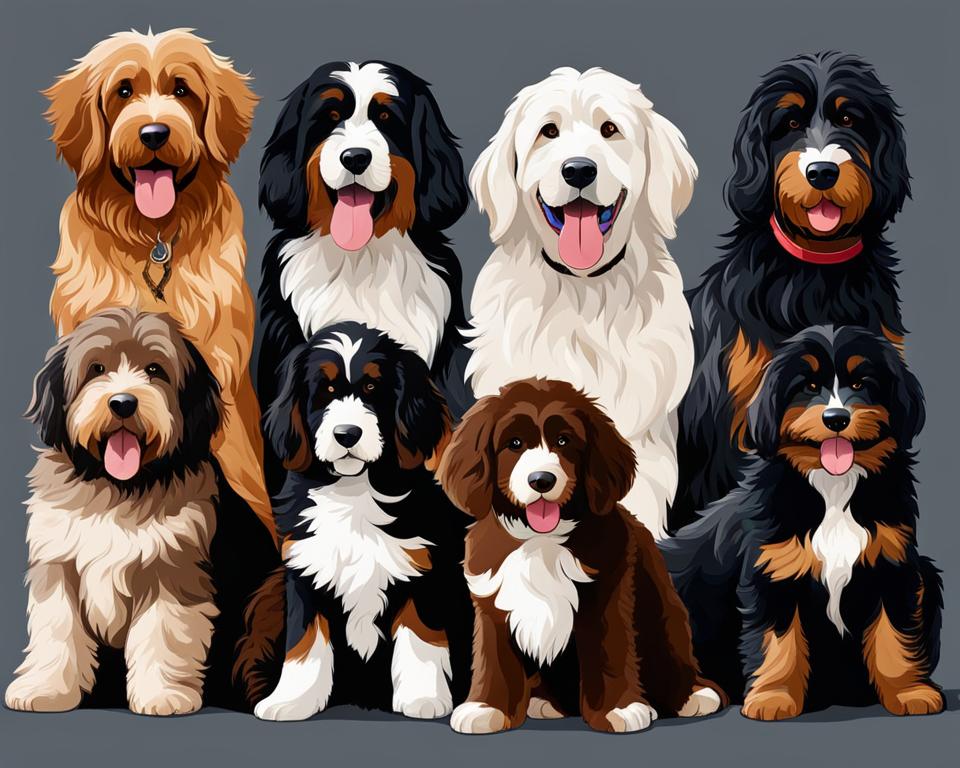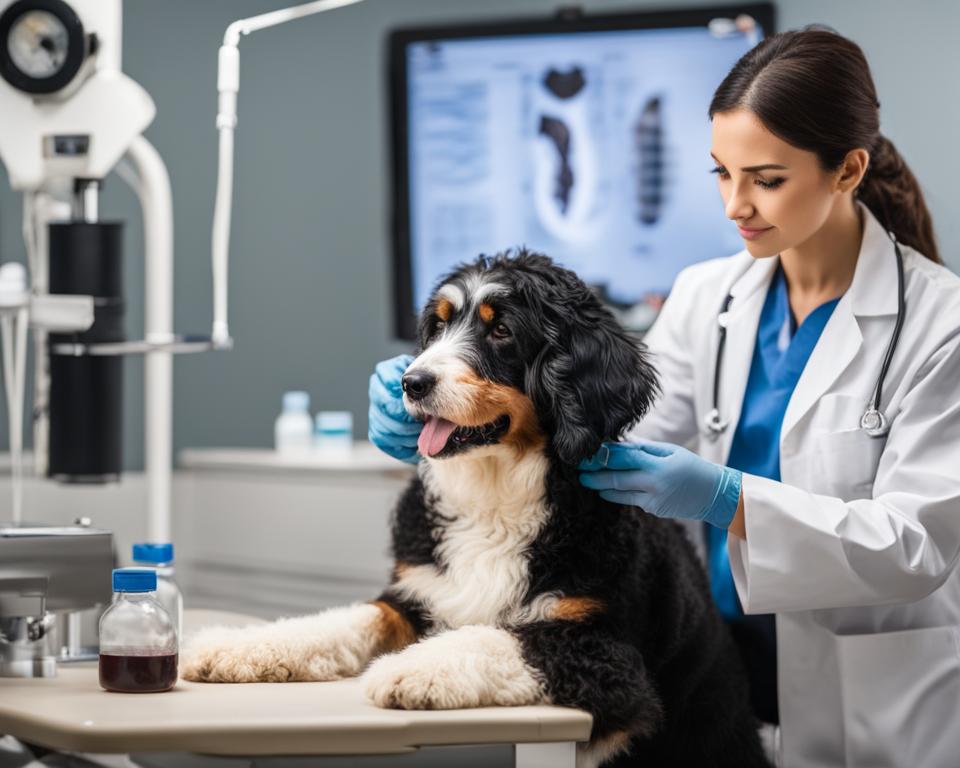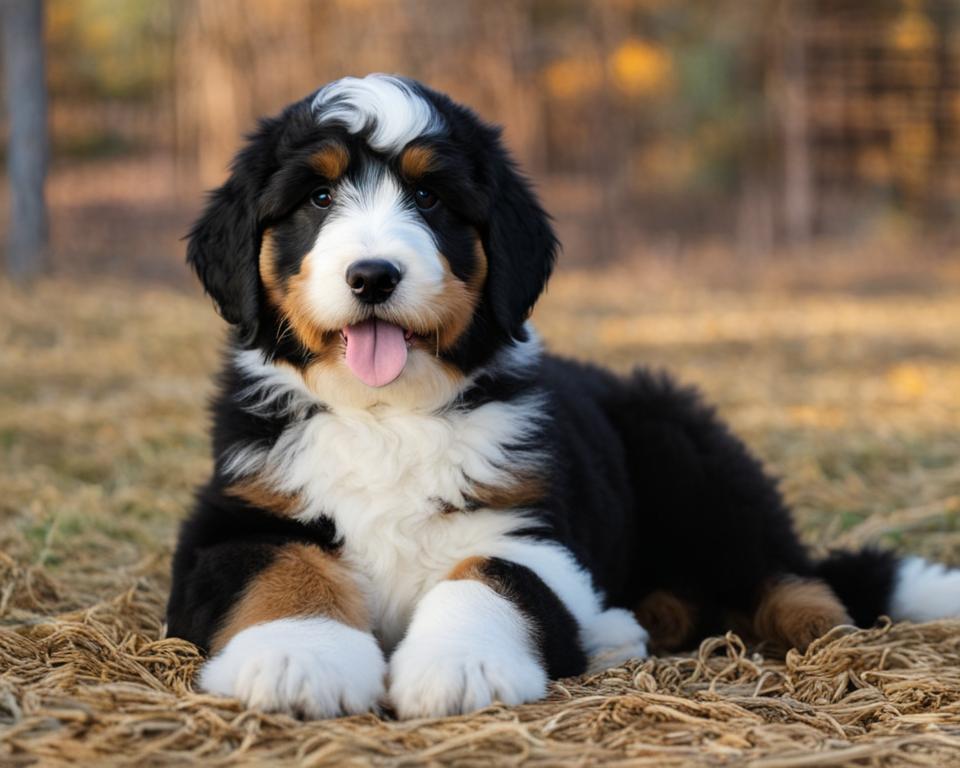Breeding Bernedoodles Responsibly, responsible Bernedoodle breeding, ethical Bernedoodle breeding, reputable Bernedoodle breeders, Bernedoodle breeding standards.
Responsible Bernedoodle breeding involves following ethical breeding practices to ensure the health and happiness of the Bernedoodles. This comprehensive guide will provide all the necessary information on responsible breeding practices for Bernedoodles, including parent selection, health testing, and puppy care.
Key Takeaways
- Responsible Bernedoodle breeding requires following ethical practices.
- Reputable breeders prioritize the health and well-being of the Bernedoodles.
- Parent selection, health testing, and puppy care are crucial aspects of responsible breeding.
- Bernedoodle breeding standards help ensure the quality and integrity of the breed.
- Choosing a reputable breeder is essential for acquiring a healthy and well-adjusted Bernedoodle.
Understanding Bernedoodles: A Wonderful Hybrid Breed
Bernedoodles are a delightful hybrid breed that combines the best qualities of the Bernese Mountain Dog and the Poodle. These intelligent and playful dogs have become increasingly popular among dog enthusiasts for their lovable nature and low-shedding coat.
Derived from the Bernese Mountain Dog and Poodle lineage, Bernedoodles inherit the intelligence and trainability of the Poodle, as well as the playful and affectionate nature of the Bernese Mountain Dog. They are known for their ability to quickly learn new commands and engage in interactive activities with their owners.
One of the standout features of Bernedoodles is their low-shedding coat, which makes them ideal for individuals with allergies or those who prefer a cleaner home environment. Their curly or wavy fur requires regular grooming to prevent matting, but it is worth the effort for the joy and companionship they provide.
Bernedoodles at a Glance:
- Intelligent: Bernedoodles have the smarts of the Poodle and excel in obedience training.
- Playful: They adore playtime and are always up for a game of fetch or a romp in the park.
- Low-shedding: Their hypoallergenic coat is a boon for those with sensitivities to pet dander.
https://www.youtube.com/watch?v=DoRuabm3ZLA
Bernedoodle Sizes:
| Size | Height (Inches) | Weight (Pounds) |
|---|---|---|
| Toy Bernedoodle | 10-14 | 10-24 |
| Mini/Medium Bernedoodle | 18-22 | 25-49 |
| Standard Bernedoodle | 23 or more | 50 or more |
As shown in the table above, Bernedoodles come in different sizes, ranging from Toy to Standard. The size of the parents used for breeding will determine the size of the puppies. Breeders carefully select the appropriate size for their breeding program to meet the preferences and needs of potential owners. Whether you’re looking for a small and compact companion or a larger, more robust family dog, there’s a Bernedoodle size that will fit your lifestyle.
Choosing the Right Breeding Stock: Size and Generations
Breeding Bernedoodles involves carefully selecting the breeding stock based on desired size and Bernedoodle generations. Bernedoodles come in different sizes, including Toy, Mini/Medium, and Standard. Each size offers unique characteristics and benefits, allowing breeders to cater to different preferences and lifestyles. Whether you’re looking for a compact and portable companion or a larger, more active dog, there is a Bernedoodle size that suits your needs.
Toy Bernedoodles are the smallest variety, typically weighing less than 25 pounds and standing around 12-17 inches tall. They are perfect for those living in apartments or smaller homes, as they require less space and exercise. Mini/Medium Bernedoodles fall in the middle range, weighing between 25-50 pounds and standing around 18-22 inches tall. They are versatile and suitable for various living situations, making them popular among families and individuals. Standard Bernedoodles are the largest variety, weighing 50 pounds or more and standing around 23-29 inches tall. They are ideal for active individuals or families with larger living spaces.
In addition to size, Bernedoodle generations also play a crucial role in breeding. The generations are denoted by F1, F1B, F2, and so on. F1 Bernedoodles are the result of a first-generation cross between a Bernese Mountain Dog and a Poodle. F1B Bernedoodles are a cross between an F1 Bernedoodle and a Poodle, resulting in a more predictable coat and reduced shedding. F2 Bernedoodles are the offspring of two F1 Bernedoodles, and so on. Each generation has its own unique traits and characteristics, allowing breeders to select the generation that best aligns with their breeding goals.

Importance of Health Testing for Breeding Bernedoodles
One of the key responsibilities of a Bernedoodle breeder is ensuring the health and well-being of the puppies. Health testing plays a crucial role in achieving this goal. Genetic testing, in particular, allows breeders to identify and address potential health issues that can be passed on to the offspring. By conducting thorough health tests, breeders can minimize the risk of inherited conditions and ensure that the puppies have the best start in life.
Bernedoodles, like many hybrid breeds, may be prone to certain health issues. Common health concerns for Bernedoodles include hip dysplasia, von Willebrand’s Disease, eye diseases such as progressive retinal atrophy (PRA) and cataracts, thyroid issues, epilepsy, and bloat. By incorporating health testing into their breeding program, responsible breeders can make informed decisions to avoid passing on these conditions to future generations.
Health testing typically involves genetic screenings, physical examinations, and evaluations of the parent dogs. Genetic screenings can detect specific genes associated with inherited diseases, providing breeders with valuable information about the potential health risks for their breeding stock. Physical examinations assess the overall health and condition of the dogs, while evaluations consider temperament and other genetic traits. It is important for breeders to work closely with licensed veterinarians who specialize in genetics and reproduction to ensure accurate and reliable testing results.
| Common Bernedoodle Health Issues | Description | Prevention |
|---|---|---|
| Hip Dysplasia | A condition where the hip joint doesn’t develop properly, leading to pain and mobility issues. | Screen breeding dogs for hip dysplasia and only breed dogs with good hip scores. |
| Von Willebrand’s Disease | A bleeding disorder caused by a deficiency of von Willebrand factor, a protein involved in blood clotting. | Test breeding dogs for von Willebrand’s Disease to avoid passing it on to offspring. |
| Eye Diseases | Progressive retinal atrophy (PRA) and cataracts are common eye diseases in Bernedoodles. | Perform regular eye exams on breeding dogs and avoid breeding dogs with eye diseases. |
| Thyroid Issues | Thyroid disorders can affect metabolism, causing weight gain, lethargy, and other symptoms. | Conduct thyroid function tests on breeding dogs and only breed dogs with healthy thyroid levels. |
| Epilepsy | A neurological disorder characterized by recurring seizures. | Ensure breeding dogs are free from epilepsy and have no family history of the condition. |
| Bloat | A potentially life-threatening condition where the stomach fills with gas and twists, causing severe discomfort. | Take preventive measures such as feeding multiple small meals, avoiding exercise after meals, and monitoring the dogs’ eating habits closely. |
By prioritizing health testing and taking measures to prevent the transmission of genetic diseases, responsible breeders can contribute to the overall health and well-being of the Bernedoodle breed. Through careful selection of breeding stock and regular health screenings, breeders can produce healthy, happy puppies that will bring joy to their future owners.

Bernedoodle Coat Testing: Achieving Low-Shedding Coats and Specific Colors
When it comes to breeding Bernedoodles, coat testing plays a vital role in achieving the desired low-shedding coats and specific colors. Breeders understand that Bernedoodle enthusiasts often prioritize these factors when selecting a new furry family member. Through coat testing, breeders can ensure that the puppies inherit the desired coat type and colors, providing a visually appealing and hypoallergenic companion to their future owners.
The process of coat testing involves understanding the genetics behind coat inheritance in Bernedoodles. This allows breeders to make informed decisions when selecting the breeding stock and predicting the coat outcomes of their litters. By utilizing genetic testing, breeders can identify the presence of the merle gene, which is responsible for the highly sought-after merle coat pattern. However, it’s important for breeders to approach the breeding of merle Bernedoodles responsibly, as improper breeding can lead to potential health issues in the puppies.
To give potential owners a clearer understanding of the variety of coat colors that Bernedoodles can possess, the following table showcases some of the common coat colors seen in this breed:
| Coat Color | Description |
|---|---|
| Black | Solid black coat |
| Phantom | Two-tone coat with distinctive markings |
| Tri-color | Black, white, and brown markings |
| Sable | Various shades of brown |
As responsible breeders, it is essential to prioritize the health, temperament, and overall well-being of Bernedoodles. Coat testing, along with other breeding practices, ensures that breeders can produce Bernedoodles with the desired coat characteristics while maintaining the breed’s integrity. By understanding and implementing coat testing practices responsibly, breeders can provide families with Bernedoodles that not only have beautiful coats but are also healthy and happy companions.
References:
- “Understanding Bernedoodles: A Wonderful Hybrid Breed.” Bernedoodle Association of America. Retrieved from https://bernedoodleassociation.com/bernese-mountain-dog-puppies/understanding-bernedoodles/
- “Bernedoodle Colors and Markings.” Midwest Bernedoodles. Retrieved from https://midwestbernedoodles.com/bernedoodle-colors-and-markings/
Consideration of Temperament and Personality Traits
When it comes to responsible breeding of Bernedoodles, temperament and personality traits play a crucial role. Reputable breeders understand the importance of producing well-tempered puppies that will make excellent companions for their future owners. This is achieved by carefully selecting well-behaved and friendly parent dogs with generations of responsibly bred dogs in their bloodline. By doing so, breeders increase the chances of offspring inheriting similar temperaments and characteristics.
It’s important to note that while breeding practices can influence temperament, each individual Bernedoodle will still have its own unique personality and quirks. Just like people, dogs have their own preferences, fears, and behaviors that make them one-of-a-kind. While responsible breeders use selective breeding to increase the likelihood of certain temperaments, it’s essential for future owners to understand that each Bernedoodle will have its own special traits and quirks, regardless of their lineage.
Choosing well-tempered parents is just one aspect of responsible breeding. Breeders must also consider the overall health, genetic background, and socialization of their breeding dogs to ensure the best possible temperament in the puppies. Early socialization, training, and mental stimulation are vital to develop a well-rounded Bernedoodle with a balanced temperament. By providing a nurturing environment and positive experiences from an early age, breeders can help foster confident, well-behaved Bernedoodles that will thrive in their new homes.
Temperament Factors to Consider:
- Friendliness towards humans and other animals
- Adaptability to different environments and lifestyles
- Trainability and willingness to learn
- Energy level and activity requirements
- Reactivity to stimuli, such as loud noises or unfamiliar situations
- Separation anxiety and attachment tendencies
Understanding and considering these temperament factors when breeding Bernedoodles is crucial for responsible breeders. It not only ensures the well-being and happiness of the puppies but also helps match them with the right owners who can provide the appropriate environment and care. Responsible breeders prioritize the overall health, temperament, and unique personalities of their Bernedoodles, offering future owners the opportunity to welcome a loving and well-adjusted companion into their lives.
Working with a Licensed Veterinarian and Ensuring Puppy Health
Collaborating with a licensed veterinarian is an essential aspect of responsible Bernedoodle breeding. A skilled and experienced veterinarian can provide valuable guidance throughout the breeding process, ensuring the health and well-being of both the pregnant dogs and their puppies.
Prenatal care is crucial for the health of the mother and the development of the puppies. The veterinarian will monitor the mother’s condition, providing necessary vaccinations and deworming treatments to protect her and the puppies from potential diseases. Regular check-ups and ultrasounds will help ensure a smooth pregnancy and identify any potential complications early on.
Enrichment methods, such as early socialization, training, and mental stimulation, play a vital role in the emotional and behavioral development of Bernedoodle puppies. A licensed veterinarian can offer expert advice on these aspects, helping breeders provide the necessary care and support to foster healthy and well-rounded puppies. Early socialization exposes the puppies to various stimuli, experiences, and interactions, promoting confidence and adaptability throughout their lives. Training and mental stimulation activities help develop their cognitive abilities and prevent boredom, ensuring they grow up to be intelligent and well-adjusted companions.
| Key Aspects of Working with a Licensed Veterinarian | Benefits to Breeders and Puppies |
|---|---|
| Prenatal care | Ensures the health of the mother and the development of the puppies |
| Guidance on vaccinations and deworming | Protects the pregnant dogs and puppies from potential diseases |
| Enrichment methods | Promotes early socialization, training, and mental stimulation for healthy emotional and behavioral development |
Working closely with a licensed veterinarian not only ensures the physical well-being of the breeding dogs and their offspring but also contributes to the overall quality of the Bernedoodle breed. By following the guidance of medical professionals, responsible breeders can uphold ethical standards and produce healthy, happy puppies that will bring joy to their future families.
Responsible Breeding, Retirement, and Rehoming
Responsible breeding goes beyond ensuring the health and well-being of the Bernedoodle puppies. It also involves considering the retirement of the breeding dogs. Ethical breeders understand the importance of limiting the number of litters a female dog produces to protect her health and prevent overbreeding. By following these ethical breeder standards, responsible breeders prioritize the long-term welfare of their dogs.
When the time comes for a breeding dog to retire, it is essential to find them a loving home where they can enjoy their golden years as cherished pets. These retired dogs have dedicated their lives to the breeding program and deserve a comfortable and happy retirement. Ethical breeders make efforts to ensure that retired dogs are placed in suitable homes that can provide the love, care, and attention they deserve.
Rehoming dogs is another aspect of responsible breeding. Sometimes, breeders may need to transition dogs out of their breeding program due to various reasons, such as changes in breeding objectives or the need to reduce the number of dogs in their care. In such cases, breeders take the responsibility to find suitable homes for these dogs, ensuring they are provided with the same level of care and love as their breeding dogs. Responsible rehoming ensures that every dog is given the opportunity to live a happy and fulfilling life beyond their breeding years.
FAQ
What is responsible Bernedoodle breeding?
Responsible Bernedoodle breeding involves following ethical practices to ensure the health and happiness of the Bernedoodles. It includes careful parent selection, health testing, and proper puppy care.
What are Bernedoodles?
Bernedoodles are a hybrid cross between the Bernese Mountain Dog and Poodle. They inherit the best traits from both breeds, including their intelligence, playfulness, and low-shedding coat.
How should breeders choose the right breeding stock for Bernedoodles?
Breeders should carefully select the breeding stock based on desired size and Bernedoodle generations. Bernedoodles come in different sizes, such as Toy, Mini/Medium, and Standard, and different generations can be bred to achieve specific characteristics and traits.
Why is health testing important in Bernedoodle breeding?
Health testing is crucial to ensure the well-being of Bernedoodle puppies. It helps identify potential genetic illnesses, such as hip dysplasia, von Willebrand’s Disease, eye diseases, thyroid issues, epilepsy, and bloat. By testing the breeding dogs, the risk of these conditions in puppies can be minimized.
How can breeders select for desired coat colors in Bernedoodles?
Coat testing and understanding the genetics behind coat inheritance can help breeders determine if a Bernedoodle will have the desired coat type and colors. This enables them to breed for low-shedding coats and specific coat colors, like the coveted merle coat pattern.
Do Bernedoodles have predictable temperaments?
While breeders can increase the likelihood of offspring inheriting specific temperament traits by using well-tempered parents with generations of responsibly bred dogs in their bloodline, it’s important to remember that each Bernedoodle will still have its own unique personality and quirks.
Why is working with a licensed veterinarian important in Bernedoodle breeding?
Collaborating with a licensed veterinarian is crucial for successful Bernedoodle breeding. The vet can provide guidance on prenatal care, vaccinations, deworming, and overall health management for the pregnant dogs and puppies. They can also offer advice on enrichment methods, such as early socialization, training, and mental stimulation.
What happens to breeding dogs after they retire?
Ethical breeders prioritize the well-being of their breeding dogs and retire them to loving homes to live out their days as beloved pets. Rehoming options are provided to ensure that every dog receives the care and love it deserves even after the breeding phase.

Leave a Reply